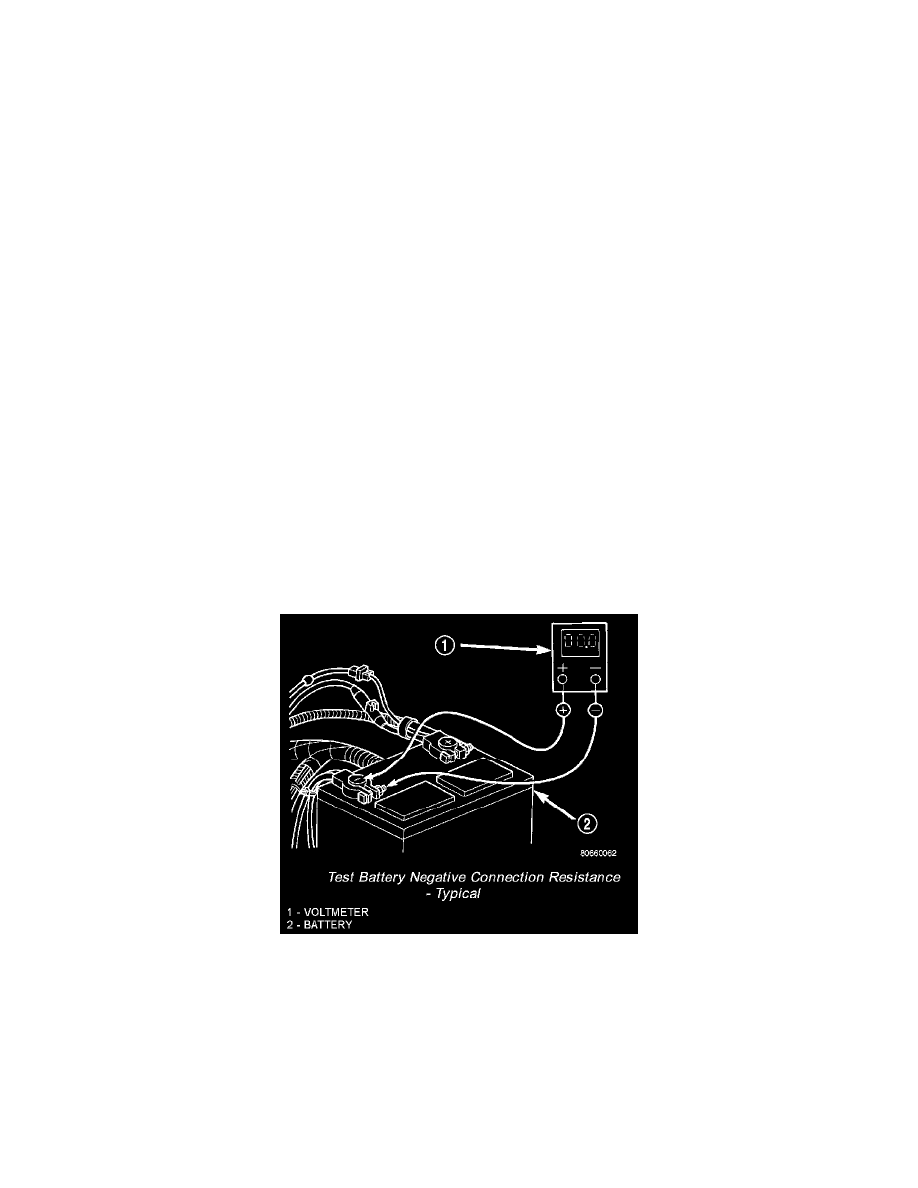Sprinter 3500 L5-2.7L DSL Turbo (2004)

Battery Cable: Testing and Inspection
A voltage drop test will determine if there is excessive resistance in the battery cable terminal connections or the battery cables. If excessive resistance is
found in the battery cable connections, the connection point should be disassembled, cleaned of all corrosion or foreign material, then reassembled.
Following reassembly, check the voltage drop for the battery cable connection and the battery cable again to confirm repair.
When performing the voltage drop test, it is important to remember that the voltage drop is giving an indication of the resistance between the two points
at which the voltmeter probes are attached. EXAMPLE: When testing the resistance of the battery positive cable, touch the voltmeter leads to the battery
positive cable terminal clamp and to the battery positive cable eyelet terminal at the starter solenoid B(+) terminal stud. If you probe the battery positive
terminal post and the battery positive cable eyelet terminal at the starter solenoid B(+) terminal stud, you are reading the combined voltage drop in the
battery positive cable terminal clamp-to-terminal post connection and the battery positive cable.
VOLTAGE DROP TEST
WARNING:
-
IF THE BATTERY SHOWS SIGNS OF FREEZING, LEAKING, LOOSE POSTS, OR LOW ELECTROLYTE LEVEL, DO NOT
TEST, ASSIST-BOOST, OR CHARGE. THE BATTERY MAY ARC INTERNALLY AND EXPLODE. PERSONAL INJURY AND/OR
VEHICLE DAMAGE MAY RESULT.
-
EXPLOSIVE HYDROGEN GAS FORMS IN AND AROUND THE BATTERY. DO NOT SMOKE, USE FLAME, OR CREATE
SPARKS NEAR THE BATTERY. PERSONAL INJURY AND/OR VEHICLE DAMAGE MAY RESULT.
-
THE BATTERY CONTAINS SULFURIC ACID, WHICH IS POISONOUS AND CAUSTIC. AVOID CONTACT WITH THE SKIN,
EYES, OR CLOTHING. IN THE EVENT OF CONTACT, FLUSH WITH WATER AND CALL A PHYSICIAN IMMEDIATELY.
KEEP OUT OF THE REACH OF CHILDREN.
-
IF THE BATTERY IS EQUIPPED WITH REMOVABLE CELL CAPS, BE CERTAIN THAT EACH OF THE CELL CAPS IS IN
PLACE AND TIGHT BEFORE THE BATTERY IS RETURNED TO SERVICE PERSONAL INJURY AND/OR VEHICLE DAMAGE
MAY RESULT FROM LOOSE OR MISSING CELL CAPS
The following operation will require a voltmeter accurate to 1/10 (0 10) volt Before performing this test, be certain that the following procedures are
accomplished
-
The battery is fully-charged and tested.
-
Fully engage the parking brake
-
Place the automatic transmission gearshift selector lever in the Park position
-
Verify that all lamps and accessories are turned off
-
Prevent the engine from starting
Test Battery Negative Connection Resistance - Typical
1. Connect the positive lead of the voltmeter to the battery negative terminal post Connect the negative lead of the voltmeter to the battery negative
cable terminal clamp Rotate and hold the ignition switch in the Start position Observe the voltmeter If voltage is detected, correct the poor
connection between the battery negative cable terminal clamp and the battery negative terminal post.
